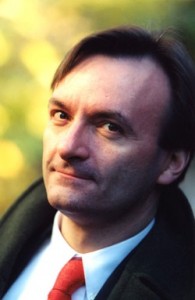CSO, Elder, and Hough lead off new year with Russian program

January in Chicago is an apt time and place for an evening of Russian music and, with the return of Sir Mark Elder, the Chicago Symphony Orchestra opened the new year with a well-balanced program of populist works and rarities. The latter came by virtue of two miniatures by Anton Liadov, which led off the evening.
Liadov is most famous for the music he didn’t compose, being given the commission to write a Firebird ballet for Diaghilev. When the famously indolent Liadov failed to write a single note, the exasperated Diaghilev turned to a young unknown named Stravinsky and the rest is musical history
The two brief works heard Thursday show scoring skill and a refined palette of colors, but nothing to equal his colleague Tchaikovsky, let alone the blazing ingenuity of the young Stravinsky. Liadov’s Baba-Yaga offers a march-like theme in a light style closer to Dukas’ Sorcerer’s Apprentice than Mussorgsky’s more malevolent view of the same flying witch. The vigorous performance by Elder and the orchestra provided worthy advocacy.
The Enchanted Lake is more impressive. A gentle evocation of a moonlit night, this short tone poem was given a refined, subtly hued performance, with Elder eliciting luminous string playing in the hushed coda.
After appearing on the same stage just last month, Stephen Hough was back to complete his two-part cycle of Tchaikovsky concertos with the most celebrated, No. 1 in B-flat minor.

Hough’s singular brand of nervy virtuosity is incapable of making anything sound routine, and the performance benefited from a more sympathetic colleague in Elder than the soloist had in December from Xian Zhang.
Still while all the big moments made an impact with Hough’s iron-fingered bravura at its finest in the blazing finale, his playing was less airtight than in the flame-throwing performance of the tortuous Second Concerto last month. At times, Hough’s penchant for spontaneity and hell-for-leather intensity got the best of him leading to a few slips along the way and some agogic phrasing that just sounded odd. The orchestra playing had its lapses as well Thursday with some surprisingly unkempt woodwinds.
While the Andantino was sensitively assayed by the soloist, it was Hough’s encore of Anton Rubenstein’s Melody in F Major that showed the more intimate side of this gifted artist, rendered with tonal delicacy and charm.
The major item on the program was Prokofiev’s Symphony No. 5. This wartime work has none of the violent terror, acidy bitterness or unapologetic tub-thumping of contemporary works of Shostakovich. Rather, Prokofiev’s symphony is largely optimistic albeit laced with a characteristic wry, sardonic touch in a work the composer intended to glorify the spirit of the “free and happy man.”
Prokofiev being Prokofiev and it being wartime in the Soviet Union, that inspiration sounds a bit forced. Even in this symphony there are dark moments such as the craggy climax of the opening Andante and a delayed coda when the mechanistic theme spins jarringly out of control.
Elder led an organic, strongly projected performance, eliciting playing that had the CSO sounding like its 1980s self, aptly in this music: brawny and hard-toned rather than the more refined corporate sheen of today.
Still, while largely well played with an emphasis on lyricism and avoiding rhetoric, there were times when the performance seemed a bit anodyne, wanting in detailing and a more distinctive view.
Elder consciously played down the bombast of the opening movement, but it wasn’t always clear that there was something else to take its place. Mostly, Thursday night’s Prokofiev felt like a work in progress and the reading will likely find a firmer footing in the ensuing performances.
The playing was solid, with strings and brass at their best. Yet with the CSO’s principal flute and oboe both off this week, there was a distinct lack of personality in the wind solos Thursday, here and in the concerto, John Bruce Yeh’s jaunty clarinet work apart.
The program will be repeated 8 p.m. Saturday. There will also be two Beyond the Score programs 1:30 p.m. Friday and 3 p.m. Sunday. Host Gerard McBurney will be joined by actors for a presentation examining Prokofiev and the composition of the Fifth Symphony followed by Elder and the CSO performing the work. cso.org 312-294-3000.
Posted in Performances


Posted Jan 07, 2011 at 11:15 am by Alan
Hi
I was at this performance and I’m glad the reviewer also found things a bit lacking. The Tchaikovsky particularly was disappointing. It lacked cohesion and emotion; sure the loud parts were very demonstrative but the overall flow of the piece was poor